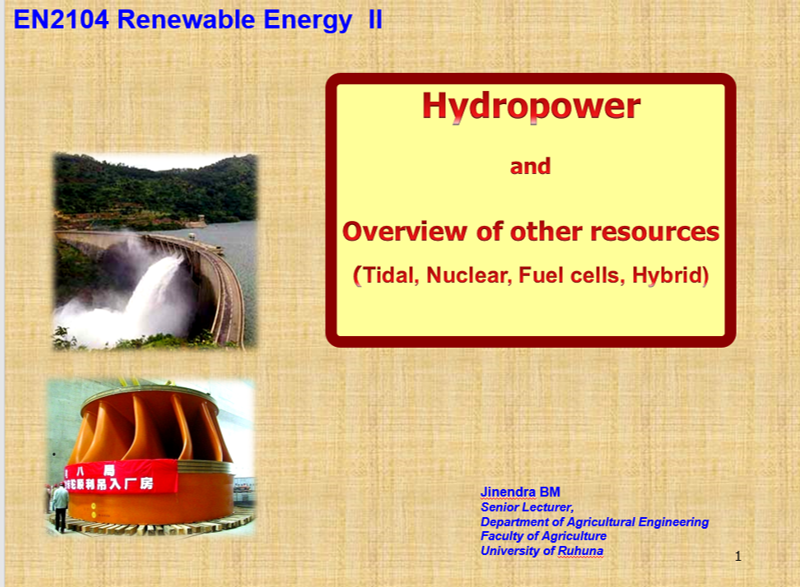c2022-en12202

- Course Coordinator: Prof. S Wijetunga
- Lecturer: Mrs. MGG Awanthi
Course Capsule:
Energy in water, Power contained in Static and flowing water, Components in a hydropower system, Energy assessment, Site assessment; configuration, sizing, installation and maintenance issues of a micro hydropower system, economic evaluation. Tidal waves Energy, Nuclear energy, Fuel cells and Hybrid technologies.
This is compulsory Three credit course module for the Degree Program Bachelor of Science in Green Technology for Semester 2-1
Course Coordinator: Dr. BM Jinendra
Teaching Panel : Dr. BM Jinendra, Mrs. CP Rupasinghe, Prof. GY Jayasinghe, Mr. PP Ruwanpathirana
Course ILOs:
1)Understand energy components in globe and local energy balance equations and familiarizing of world trends and the difference should be in managing energy-based strategies based on global and local prospective
2)Emphasize and explain the environmental consequences due to excessive use of fossil fuel and urgent priority need of promoting renewable energy and the challenges of it (with relevant IEA statistics)
3)Understand the key technology behind different types of renewable energy harvesting and utilizing systems. Hydro, tidal waves energy, nuclear energy, fuel cells and hybrid technologies
4)Estimate the energy in a water, following the basic designing steps of a hydroelectric scheme and their functions in a non-conventional hydropower system layout

Course Capsule: The course consists of theory and practical revelation on Energy flows and suppliers, Energy basics (Units, measurements, etc.), Global and Domestic energy demand, Energy inputs and Outputs in Agricultural Products, Energy sources, Energy flow in production process, Energy auditing, Energy conservation.
Course ILOs: After completion of the course student will be able to:
Total number of Credits and Contact Hours: (2 credits :15T+30P)
Teaching Panel : Prof. P L A G Alwis (CC), Ms. C P Rupasinghe, Mr. KMTS Bandara, Mr. PP Ruwanpathirana